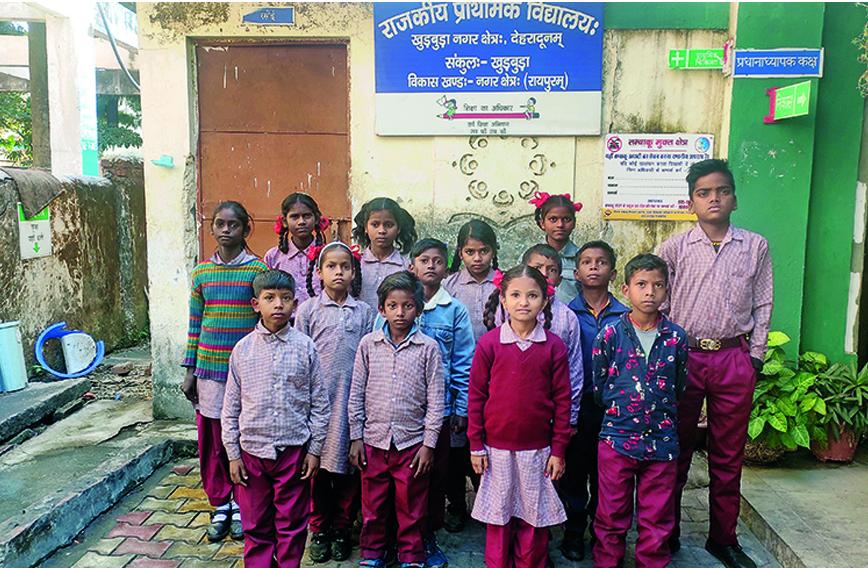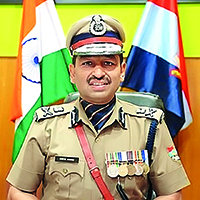
Children who were rescued and placed in school
Doon's street children find a police parent
Rakesh Agrawal, Dehradun
Neha is a cheerful girl who studies in Class 3. She looks smart in her off-white checked uniform, answering questions put to her by the teacher in her social studies class.
“I joined the school in April 2021, when poolis chacha (policeman uncle) talked to my parents. He convinced them to let me go to school. So here I am and my ambition now is to become a schoolteacher,” she says.
Neha used to beg at traffic crossings so that she could earn some money to supplement her family’s meagre income. Her father is a daily wage labourer and her mother a domestic worker.
For thousands of former child beggars, poolis chacha aka Ashok Kumar, a suave IPS officer, is the hero who changed their lives.
It’s a common sight in every city to see children begging and selling cheap stuff like dusters, pens, combs and mobile chargers at redlights. Most car owners roll up their windows or drop a few coins into those smudgy hands.
Ashok Kumar too noted the ubiquitous sight of child beggars at traffic crossings. But, instead of turning a blind eye, he decided to pick up child beggars from the streets of Dehradun and enrol them in schools where they could study and become engineers, doctors, teachers, scientists or whatever their hearts desired.
That’s why he started Mission Mukti in December 2017. Ashok Kumar decided to implement the Children Act, 1960 across the state. It is a law that bans child begging but is rarely invoked. Mission Mukti’s slogan was ‘Bhiksha nahi, Shiksha do’ (give us education, not alms). The word mukti was chosen because it denotes ‘liberating’ children from begging.
“In 99 percent of cases, we found that children were forced into begging or hawking by their parents. The children earned about `500 a day or about `15,000 a month. The parents don’t want to work. So, convincing such parents to educate their children isn’t easy,” Kumar explains.
 |
| Ashok Kumar |
Ashok Kumar was Additional Director General (Administration/Home Guards) from December 2016 to August 2017 and then Additional Director General (Secretary, Police Sports) from October 2016 to January 2018. He retired on December 1, 2023.
“Identifying such children is easy. Enrolling and retaining them in schools is challenging. Many times children drop out from the schools where we enrol them. Parents remove them from schools forcefully. So, we have to make consistent effort. We do regular follow-ups and we counsel the parents to work. In the initial phase, the dropout rate was 50 percent. This has reduced to 20 percent now,” says Kumar.
In October 2019, in just a fortnight, 200 children were rescued and enrolled in various schools by the Uttarakhand police in Haridwar.
Neha’s friend, Akash, studies in Class 5. He too joined the Upper Primary School (UPS) in Khudbuda, a locality in the centre of Dehradun city, three years ago.
He lives with his parents in Govindgarh, Ajabpur, a slum colony in the city. He used to spend his day helping his father sell mobile cases at street crossings. His mother is a domestic worker. His small earnings were needed for his seven-member family.
“I love maths and I want to become a scientist when I grow up,” he declares.
Both Neha and Akash are doing extremely well in school. Neha scored 98 percent and Akash 91 in the half-yearly examinations.
There is a brother-sister duo too who were picked up by the police and sent to the same school three years ago. Rupa is 11 and Suraj is 13. Suraj used to be a street vendor. Rupa worked as a rag-picker. Both children earned money for their family of six. Their father is a daily wager.
“I’m in Class 5 and my brother is in Class 7. We love to study Hindi. When I grow up I want to join the police force and be like Ashok chacha. He is my role model,” says Rupa.
“I, too, want to follow in his footsteps and become an engineer like him,” says Suraj, who loves mathematics.
Kumar had earned a BTech degree in mechanical engineering in 1986 and an MTech in thermal engineering in 1988 from the Indian Institute of Technology (IIT), Delhi. He then appeared for the civil services exam the very next year and joined the IPS.
Teachers and principals are impressed by the learning capabilities of these children. “The children have a good grasp of the subjects we teach, although the girls are better than the boys,” says Neha Sayana, a class teacher.
Seema Parveen, principal of the school in Khudbuda, is also very supportive. “This is a good initiative by Ashokji. It will enable the children to become part of mainstream society and contribute to it,” she says.
Mission Mukti is not just limited to Dehradun city. Many schools across Uttarakhand now have hundreds of such deprived and destitute children. Ten-year-old Aksha studies in Class 5 in Convent School, Srinagar, in Pauri Garhwal district. “I was admitted here in 2022 and this year I came second in class,” says the proud student who scored 88.73 percent.
Zeenat, a Class 6 student in Junior High School, Sailanigath, Tanakpur, Champawat district, says, “I love to participate in all sports and cultural activities in school.” Zeenat scored 90.22 percent!
So far, more than 7,600 children between five and 15 years have been rescued. Of them, 3,600 were admitted to government schools and 13 sent to correction homes in the state.
The task of enrolling and retaining children in schools has been given to the police personnel of the Anti-Human Trafficking Units (AHTU) of the Uttarakhand police in all 13 districts of Uttarakhand. “Since most of these children are a good source of income, it’s very tough to convince their parents,” says Dharmendra Kumar, member of AHTU in Dehradun.
He explained that this means they have to keep track of the child with regular follow-ups and counselling of parents. They have to ensure the child remains in school.
What has motivated the police to take up this mission with such a sense of purpose? “Today’s children are tomorrow’s citizens. We want them to lead productive lives and not become criminals or gang members. Educating them would reduce this possibility significantly. That means better law and order, less policing and better citizens,” says Ashok Kumar.
His work was highlighted in a 2022 book, Best Practices on Smart Policing. The book is on the good work done by the police and police organizations of different states.
Comments
Currently there are no Comments. Be first to write a comment!



